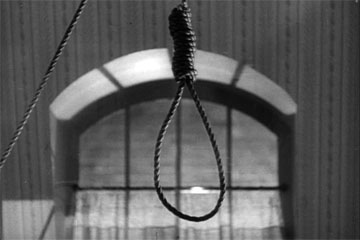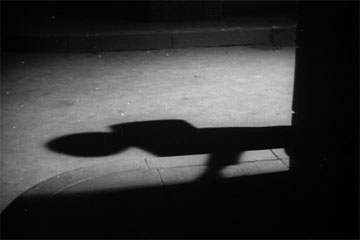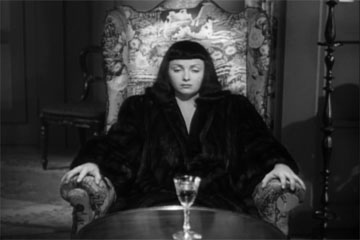
Just Remember - Death is Not the End!
This is part one in a series of articles relating to Val Lewton and the mark he left upon the horror genre. In this series I will concentrate on Lewton as the auteur of the films he produced: the arguments for this are perfectly compelling and generally accepted . . . I will also assume that you have seen the films in question; otherwise, there will be spoilers.
After Orson Welles had nearly bankrupted RKO with Citizen Kane and The Magnificent Ambersons the studio was forced to turn to other venues for capital. Universal had made money hand-over-fist with their unique brand of horror: RKO decided that they could do the same. To that end they brought Val Lewton on board from MGM (where he'd worked for David O. Selznick), assigning him to the B-horror segment. As head of this unit, Lewton had three mandates. All films had to be under 75 minutes, cost less than $150k, and all film titles would be assigned. Universal had just released The Wolf Man with great returns, so RKO demanded Lewton's first film: Cat People. You can see what their plan was.
Lewton, however, did not exactly comply, instead producing the kind of atmospheric, subtle films that Jonathan Rosenbaum argues create, and constitute, an entire branch of the horror genre. I will touch more on this subject later, but for now let me say that on their surface all Lewton horror films seem a reaction to the Universal Pictures standard of horror and also to Orson Welles. There were two other mandates that modulated Lewton's primary three: RKO's post-Welles' motto of "showmanship before genius" and Lewton's own rule of "no horror heaped on horror." Universal had made it a point to create world's wholly separate from our own where horrific creatures like the wolf man existed realistically by fact of his world's own alien horror. These films were deeply popular with the WWII crowd because they allowed an escapist pleasure from the terror of day-to-day life, but they could never truly create horror because their world was so detatched. Conversely, Lewton spent most of his movies creating realistic worlds where, it's true, some people could maybe turn into cats, become zombies, or return from the dead. This model is certainly a departure from Universal's and met with good effect in the box office. It's this grounding, also, that makes the films equal reactions to Welles - simple movies made on simple, leftover sets, with little departure or granduer. It was because of Welles that Lewton had to fight for every penny he got to make these films, and even at times artistic control, which certainly didn't help matters.
 Shadows In The Alley
Shadows In The Alley
(. . . did I mention speaking the vision? That aforementioned friend also mentioned the film's lack of filmic quality - that it was, at times, merely filmed theater, hardly aware of its transient abilities. One rare exception is the shower scene where Mary is confronted by the unknown quantity of the satanist. This scene has the true potential for horror, and it seems hardly possible that Alfred Hitchcock had not seen it before creating his own in Psycho.)
After Orson Welles had nearly bankrupted RKO with Citizen Kane and The Magnificent Ambersons the studio was forced to turn to other venues for capital. Universal had made money hand-over-fist with their unique brand of horror: RKO decided that they could do the same. To that end they brought Val Lewton on board from MGM (where he'd worked for David O. Selznick), assigning him to the B-horror segment. As head of this unit, Lewton had three mandates. All films had to be under 75 minutes, cost less than $150k, and all film titles would be assigned. Universal had just released The Wolf Man with great returns, so RKO demanded Lewton's first film: Cat People. You can see what their plan was.
Lewton, however, did not exactly comply, instead producing the kind of atmospheric, subtle films that Jonathan Rosenbaum argues create, and constitute, an entire branch of the horror genre. I will touch more on this subject later, but for now let me say that on their surface all Lewton horror films seem a reaction to the Universal Pictures standard of horror and also to Orson Welles. There were two other mandates that modulated Lewton's primary three: RKO's post-Welles' motto of "showmanship before genius" and Lewton's own rule of "no horror heaped on horror." Universal had made it a point to create world's wholly separate from our own where horrific creatures like the wolf man existed realistically by fact of his world's own alien horror. These films were deeply popular with the WWII crowd because they allowed an escapist pleasure from the terror of day-to-day life, but they could never truly create horror because their world was so detatched. Conversely, Lewton spent most of his movies creating realistic worlds where, it's true, some people could maybe turn into cats, become zombies, or return from the dead. This model is certainly a departure from Universal's and met with good effect in the box office. It's this grounding, also, that makes the films equal reactions to Welles - simple movies made on simple, leftover sets, with little departure or granduer. It was because of Welles that Lewton had to fight for every penny he got to make these films, and even at times artistic control, which certainly didn't help matters.
The Seventh Victim, produced by Val Lewton and directed by Mark Robson, was released in 1943 by RKO Radio Pictures. It is the fourth film Lewton made with RKO and the greatest departure from the "reality with a twist of the supernatural" mode which had made Lewton's first films (Cat People, I Walked with a Zombie, The Leopard Man) box office hits. It is also, I think, Lewton's greatest film, although flawed. His later films come together more successfully in terms of fit and finish, but this, I think, is where we come closest to seeing a true artistic attempt.
In The Seventh Victim, Lewton creates a wholly insular world wherein there is no solace, no light. Unlike his other works, he approached this film with a clear message: "Death is good." And then proceeded to seep the goodness out of all life in reaction to this. The idea of familial love is lost: Mary's love for Jacqueline (accentuated by a kind of hesitant indifference) amounts to an interest in where she might be, Jacqueline's love for Mary is lost in her own ambivalence, the Palladist's love for Jacqueline lost in her betrayal. Romantic love is lost: Ward's love for Jacqueline lost to his love for Mary, Hoag's love lost to insanity . . . New York is an empty place totally void of anything but shadow produced by unseen light. God is a facet of Dr. Judd's intellect, brought forth only in defense. Jean Brooks' Jacqueline is nearly as alive at the end of the film as she is during it, her suicide an escape from nothingness to nothingness.
In The Seventh Victim, Lewton creates a wholly insular world wherein there is no solace, no light. Unlike his other works, he approached this film with a clear message: "Death is good." And then proceeded to seep the goodness out of all life in reaction to this. The idea of familial love is lost: Mary's love for Jacqueline (accentuated by a kind of hesitant indifference) amounts to an interest in where she might be, Jacqueline's love for Mary is lost in her own ambivalence, the Palladist's love for Jacqueline lost in her betrayal. Romantic love is lost: Ward's love for Jacqueline lost to his love for Mary, Hoag's love lost to insanity . . . New York is an empty place totally void of anything but shadow produced by unseen light. God is a facet of Dr. Judd's intellect, brought forth only in defense. Jean Brooks' Jacqueline is nearly as alive at the end of the film as she is during it, her suicide an escape from nothingness to nothingness.
 Shadows In The Alley
Shadows In The AlleyThere are many precursors to film noir here, most from Fritz Lang's work - and they inform the aforementioned sense of atmosphere in a way familiar to fans of German cinema. The subtle horror that the film attempts comes from the complete meaningless of life within it and the equally meaningless horror of death.
A friend pointed out that the oddness of the film's beginning is not well maintained throughout, and I agree. The beginning of the film sets a breathless pace, with a near-instant change of location, the introduction of a whole cast of characters with intricate, preformed relationships to themselves but not to the protagonist (who we cling to because we have no one else), and a vaguely sinister overtone. But from the time where Jacqueline is reunited with Mary we gain a sense of normalcy that even the Palladists cannot overcome. If Jacqueline succombs to them and drinks the poison we know that there will be a reaction: Mary will find out, she will know why, as will Dr. Judd and Ward. There will be interactions, formulaic reactions - possibly prosecution, retribution, resignation. The materialization of Jacqueline from the shadows provides a point from which the random, colorless chaos of the world can be ordered. That order, and those reactions, create meaning to both Jacqueline's life and death. It will still be bleak, but the terror is now steeped in a familiar tone with familiar outcomes. Where is the terror in the familiar? That, I fear, is far beyond Val Lewton's grip.

Jacqueline Facing Death
Fritz Lang's Destiny - twenty-two years this film's senior - has at its heart the selfsame message, as would Bergman's The Seventh Seal fourteen years later: Death is inescapable and indeed to be welcomed as a relief to the awful strife of this world. Destiny does not attempt to show the supposed-horror of death in a nihilistic world - a virtually unattainable goal. Rather, it works to show that the bittersweet pain of the world is ended in death, replaced by a utopian beauty where love is forged anew in green pastures. God in this film, rather than a cold intellectual force, shows that "love is strong as death." Conversely, The Seventh Seal creates Death itself as a facet of life, the terrifying part of the-God-within with whom we carry on a constant monologue, praying for a response to our call. That response is the melancholy, everyday beauty of our own lives that prods us ever gently back to the Earth at the same time that it calls us home to Him. "Death is good" by contrast becomes a childish mantra by a man with a vision, but without the words to speak it.
A friend pointed out that the oddness of the film's beginning is not well maintained throughout, and I agree. The beginning of the film sets a breathless pace, with a near-instant change of location, the introduction of a whole cast of characters with intricate, preformed relationships to themselves but not to the protagonist (who we cling to because we have no one else), and a vaguely sinister overtone. But from the time where Jacqueline is reunited with Mary we gain a sense of normalcy that even the Palladists cannot overcome. If Jacqueline succombs to them and drinks the poison we know that there will be a reaction: Mary will find out, she will know why, as will Dr. Judd and Ward. There will be interactions, formulaic reactions - possibly prosecution, retribution, resignation. The materialization of Jacqueline from the shadows provides a point from which the random, colorless chaos of the world can be ordered. That order, and those reactions, create meaning to both Jacqueline's life and death. It will still be bleak, but the terror is now steeped in a familiar tone with familiar outcomes. Where is the terror in the familiar? That, I fear, is far beyond Val Lewton's grip.

Jacqueline Facing Death
Fritz Lang's Destiny - twenty-two years this film's senior - has at its heart the selfsame message, as would Bergman's The Seventh Seal fourteen years later: Death is inescapable and indeed to be welcomed as a relief to the awful strife of this world. Destiny does not attempt to show the supposed-horror of death in a nihilistic world - a virtually unattainable goal. Rather, it works to show that the bittersweet pain of the world is ended in death, replaced by a utopian beauty where love is forged anew in green pastures. God in this film, rather than a cold intellectual force, shows that "love is strong as death." Conversely, The Seventh Seal creates Death itself as a facet of life, the terrifying part of the-God-within with whom we carry on a constant monologue, praying for a response to our call. That response is the melancholy, everyday beauty of our own lives that prods us ever gently back to the Earth at the same time that it calls us home to Him. "Death is good" by contrast becomes a childish mantra by a man with a vision, but without the words to speak it.
(. . . did I mention speaking the vision? That aforementioned friend also mentioned the film's lack of filmic quality - that it was, at times, merely filmed theater, hardly aware of its transient abilities. One rare exception is the shower scene where Mary is confronted by the unknown quantity of the satanist. This scene has the true potential for horror, and it seems hardly possible that Alfred Hitchcock had not seen it before creating his own in Psycho.)







